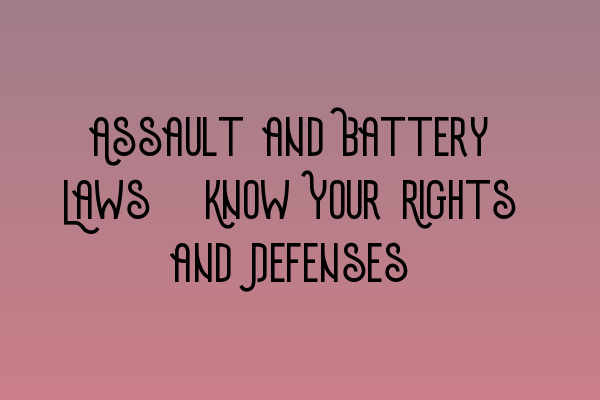Assault and Battery Laws: Know Your Rights and Defenses
Assault and battery are serious criminal offenses that can have significant consequences for those involved. Understanding your rights and defenses is crucial to protecting yourself and navigating the legal system. In this blog post, we will explore the key aspects of assault and battery laws in the UK, providing you with the knowledge you need to handle these situations.
What is Assault?
Assault refers to an act that causes a person to apprehend the infliction of immediate, unlawful force. It can involve physical harm, the threat of physical harm, or the intentional creation of fear. Assault can occur even without direct physical contact. For a detailed understanding of assault laws in the UK, refer to our article on Legal Representation for Delaware LLCs in the UK: Expert Advice.
What is Battery?
Battery, on the other hand, refers to the intentional and unlawful application of force on another person. Unlike assault, battery requires physical contact. It can include actions like punching, slapping, or any other form of physical aggression. To learn more about battery laws and the legal implications involved, check out our article on Ensuring Ethical Business Practices: Delaware’s Code of Conduct.
Defenses for Assault and Battery Charges
If you find yourself facing assault or battery charges, it’s essential to understand the potential defenses available. These defenses can help secure your rights and protect your freedom. Common defenses include:
- Self-Defense: You may claim that you acted in self-defense to protect yourself or someone else from imminent harm. The circumstances will determine the viability of this defense.
- Consent: If the alleged victim consented to the physical contact, it can be a strong defense against battery charges. However, consent must be given voluntarily and without any coercion.
- Defense of Property: In certain cases, you may be justified in using force to defend your property from unlawful intrusion or threat.
- Lack of Intent: If you can demonstrate that you did not have the intention to cause harm, it may weaken the prosecution’s case against you.
To learn more about effective defenses for assault and battery charges, refer to our article on Legal Challenges for UK Businesses in the U.S.: Strategies for Overcoming Hurdles. This article provides valuable insights into the strategies and tactics that can support your defense.
Contacting an Experienced Criminal Defense Solicitor
If you are facing assault or battery charges, it’s crucial to seek professional legal representation. An experienced criminal defense solicitor can guide you through the legal process and ensure that your rights are protected. For assistance in finding the right solicitor for your case, refer to our article on SQE Exam Prep: Essential Study Materials for Aspiring Solicitors.
In conclusion, assault and battery are serious criminal offenses, and knowing your rights and defenses is essential when facing charges. Understanding the definitions of assault and battery, as well as the potential defenses, can help you navigate the legal system more effectively. If you find yourself in such a situation, it is strongly advised to seek the assistance of an experienced criminal defense solicitor.
For more information on related legal topics, we invite you to explore the following articles:
- Legal Representation for Delaware LLCs in the UK: Expert Advice
- Ensuring Ethical Business Practices: Delaware’s Code of Conduct
- Legal Challenges for UK Businesses in the U.S.: Strategies for Overcoming Hurdles
- Legal Challenges for UK Businesses in the U.S.: Strategies for Overcoming Hurdles
- SQE Exam Prep: Essential Study Materials for Aspiring Solicitors
At SQE Criminal Law & Practice Law UK, we are committed to providing expert advice and guidance on legal matters. If you have any questions or need assistance with criminal law cases, do not hesitate to reach out to us.
